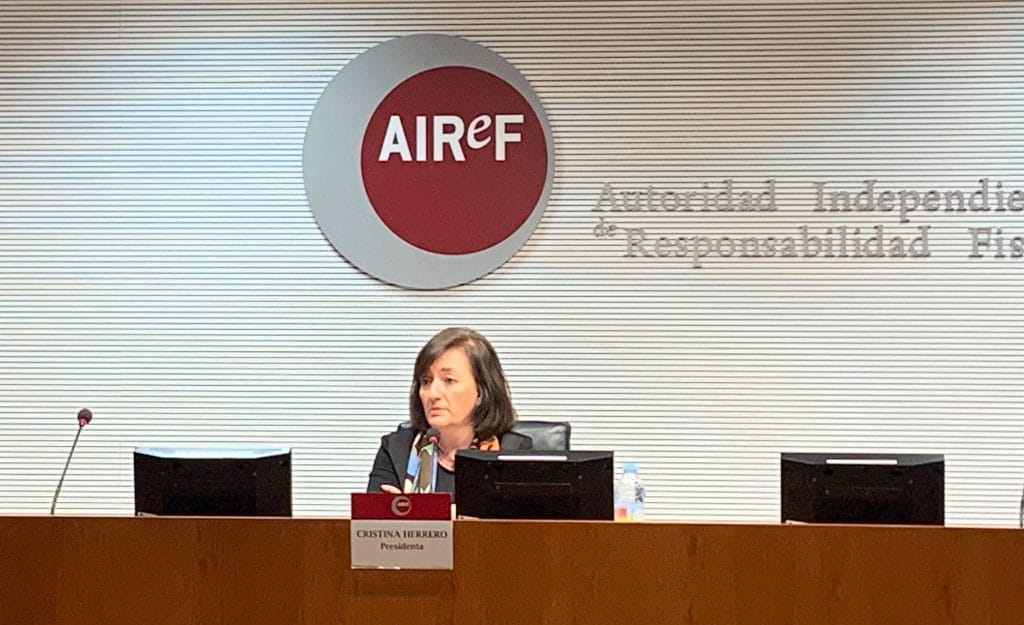
- In its report on the Stabiility Programme Update (SPU), the Independent Authority for Fiscal Responsability (AIReF) has included two of its own macroeconomic and fiscal scenarios to respond to current circumstances
- In the most positive scenario, which is similar to that of the Stability Programme Update (SPU), the deficit would be 10.9% GDP in 2020. The more adverse scenario, caused by an extension of confinement measures, would lead to a deficit of 13.8% GDP in 2020
- Unlike the SPU, AIReF includes deficit projections for 2021 that place the Public Administrations’ balance at -7.5% GDP in the first scenario and -9.4% GDP in the second
- In the less adverse scenario, GDP would decrease by 8.9% in 2020 and grow 4.6% in 2021. In the more adverse scenario, the decrease in GDP would reach 11.7% in 2020 and grow by 5.8% in 2021
- AIReF believes that the Spanish economy has some structural features that will make the recovery slow and gradual in both scenarios, meaning that it will take several quarters to return to previous GDP levels
- In this financial year, the COVID-19 crisis is expected to trigger an increase in the public deficit of between 8.8%‑and‑6%
- AIReF recommends using the fiscal margin allowed under European and national regulations. In the aftermath of the crisis, a fiscal consolidation will be needed, therefore AIReF recommends to start preparing the fiscal exit strategy which requires, under national law, the preparation of a Rebalancing Plan
The Independent Authority for Fiscal Responsibility (AIReF) published the report on the 2020-2021 Stability Programme Update (SPU) today. Following an initial analysis, the report provides a comprehensive assessment of the Government’s macroeconomic forecasts of 30th April. The institution has adapted its analysis of the report to respond to current circumstances and has developed its own macroeconomic and fiscal scenarios. AIReF predicts that the public deficit would rise to 10.9% GDP in the more positive scenario, which is similar to the SPU’s assumptions. In the event of a more adverse scenario, which, amongst other factors, would require confinement measure to be extended, the 2020 deficit would stand at 13.8% GDP in 2020. Unlike the SPU, AIReF includes deficit projections for 2021 that place the public deficit at 7.5% GDP in the first scenario and 9.4% GDP in the second. In the more positive scenario, GDP would decrease by 8.9% in 2020 and increase by 4.6% in 2021.
AIReF has established the two scenarios based on assumptions about the duration of the epidemic:
- In the first scenario, it bases predictions on the hypothesis that epidemiological factors will allow restrictions to begin to be relaxed in mid-May.
- The second, more adverse scenario is based on the possibility that confinement and economic activity restrictions will be prolonged for another month.
AIReF believes that the Spanish economy has some structural features that will make the recovery slow and gradual in both scenarios, meaning that it will take several quarters to return to previous GDP levels.
Impact of COVID-19
In 2020, the COVID-19 crisis is expected to trigger an increase in the public deficit of between 8.8 and 11.6% GDP, in comparison with the pre-crisis prediction. The impact is broken down into three factors: measures adopted, decline in activity and the denominator effect that is a result of the notable decline in GDP. The measures adopted to date represent an increase in the deficit of 3.3-4.2% GDP. Meanwhile, the decline in activity will entail a deficit increase of 4.6-6% GDP depending on which scenario occurs, while the denominator effect entails a deficit increase of 0.9-1.4% GDP.
AIReF therefore predicts that 2020 revenue will stand at 39.5%-39.4% GDP, both scenarios below the 41.2% predicted in the SPU. Meanwhile, expenditure is expected to increase to 50.4-53.2% GDP, with the SPU’s estimate of 51.5% falling between the two scenarios.
Despite the temporary nature of the current health crisis, AIReF estimates that the public deficit will be 7.5-9.4% in 2021, depending on which scenario arises. The recovery of economic activity in 2021 will not be sufficient to reverse the macroeconomic impact of the crisis on public accounts.
By sub-sector, the institution predicts that all sub-sectors’ fiscal balance will decline in both scenarios, although the Administración Central (Central Administration) and Fondos de la Seguridad Social (Social Security Funds) will bear the greatest impact.
Meanwhile, AIReF believes that the SPU’s fiscal forecasts are not entirely consistent with the macroeconomic scenario. On the expenditure side, the macroeconomic scenario reflects a 4.8% public consumption growth, which is lower than and apparently incompatible with the growth estimated for compensation of employees (6.1%), intermediate consumption and social transfers in kind (8.6%), which are its main components. In terms of revenue, AIReF’s models have predicted that the revenue level that will be achieved based on the SPU’s macroeconomic assumptions would be 40% GDP, lower than the SPU’s 41.2%. Therefore, if the SPU’s macroeconomic scenario is correct, the public deficit would be higher.
In terms of sustainability, AIReF projects an increase in the debt-to-GDP ratio of 20-27% in 2020, with an additional 2% increase in 2021. This would result in a debt-to-GDP ratio of 115-122% in 2020 and 117-124% in 2021.
In this context, AIReF recommends using the fiscal margin allowed under European and national regulations. In the aftermath of the crisis fiscal consolidation will be needed, therefore AIReF recommends to start preparing the fiscal exit strategy which requires, by law, the preparation of a Rebalancing Plan that considers the European context.





